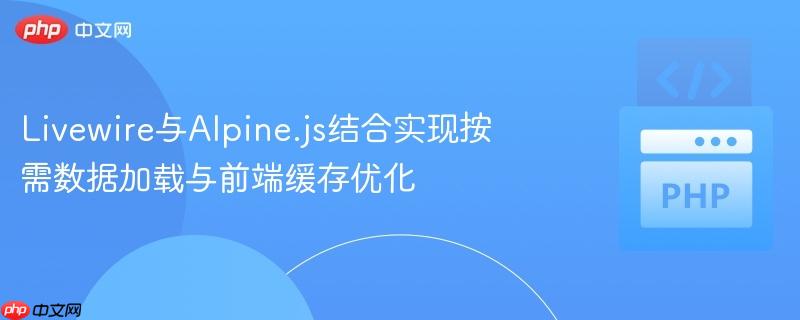
优化动态数据加载的挑战
在构建交互式web应用时,我们经常会遇到需要根据用户选择动态加载相关数据的情景,例如,选择一个国家后显示其对应的省份或州。传统的livewire方法通常会在每次用户选择变化时触发后端方法,从数据库中重新获取数据。虽然livewire的响应速度很快,但对于频繁且重复的请求,这会造成不必要的服务器负载和数据库查询,尤其是在数据量较大或用户操作频繁时,可能影响应用性能和用户体验。
例如,一个典型的国家-州选择器可能这样实现:
对应的Livewire组件方法:
public function fillStates()
{
$states = State::where('country_id', $this->selectedCountry)->get();
if(count($states)) {
// 将数据存储在Livewire组件的公共属性中
$this->states[$this->selectedCountry] = $states;
return $this->states[$this->selectedCountry];
}
return [];
}这种方法的问题在于,如果用户先选择了“美国”,然后选择“加拿大”,再重新选择“美国”,Livewire的fillStates方法会每次都触发,即使“美国”的州数据已经被获取过一次。
结合Alpine.js实现前端缓存策略
为了解决上述重复数据请求的问题,我们可以引入Alpine.js在客户端实现一个简单的缓存机制。核心思路是:
立即学习“前端免费学习笔记(深入)”;
- 客户端状态管理: 使用Alpine.js管理当前选中的国家ID以及一个用于缓存已加载州数据的JavaScript对象。
- 监听变化: 当用户选择的国家发生变化时,Alpine.js会监听这个变化。
- 缓存检查: 在触发Livewire后端请求之前,Alpine.js会检查缓存中是否已经存在该国家对应的州数据。
- 按需请求: 如果缓存中没有,则通过Livewire向服务器发起请求;如果已有,则直接从缓存中读取。
- 缓存数据: 从Livewire获取到数据后,将其存储到Alpine.js的缓存对象中,以备下次使用。
下面是具体的实现代码:
States for :
代码解析:
-
x-data: 初始化Alpine.js组件的数据。
- selectedCountry: 绑定到
- cachedStates: 一个JavaScript对象,作为客户端的缓存。它的键是国家ID,值是该国家对应的州列表。
-
x-init="$watch('selectedCountry', ...)": 在组件初始化后,Alpine.js会监听selectedCountry属性的变化。
- if (value && ! (value in cachedStates)): 这是核心的缓存检查逻辑。它确保只有当selectedCountry有实际值(非空)且cachedStates中不包含该国家的数据时,才执行后续的Livewire请求。
- @this.call('fillStates'): 这会调用Livewire组件中的fillStates方法。我们使用.then()来确保在Livewire方法执行完毕并更新其states属性后,再进行缓存操作。
- cachedStates[value] = @this.get('states')[value];: 从Livewire组件的states属性中获取针对当前selectedCountry的数据,并将其存储到Alpine.js的cachedStates对象中。请注意,@this.get('states')会获取Livewire组件中整个$this->states属性(一个包含所有已加载国家州数据的关联数组),我们通过[value]来精确获取当前国家的州数据。
Livewire后端方法的调整:
Livewire组件的fillStates方法无需做太多改变,它仍然负责从数据库获取数据并更新组件的$states属性。关键在于,现在这个方法只有在Alpine.js判断客户端没有缓存数据时才会被调用。
// 在Livewire组件中定义 $states 属性
public $states = [];
public $selectedCountry; // 确保这个属性也存在
public function fillStates()
{
// 只有当$this->selectedCountry有值且当前国家的州数据尚未加载时才执行数据库查询
// 尽管Alpine.js已经做了判断,Livewire内部也可以增加一层防御性检查
if ($this->selectedCountry && !isset($this->states[$this->selectedCountry])) {
$states = State::where('country_id', $this->selectedCountry)->get();
if(count($states)) {
$this->states[$this->selectedCountry] = $states;
} else {
$this->states[$this->selectedCountry] = []; // 确保即使没有数据也初始化为空数组
}
}
// Livewire会自动将公共属性(如$states)同步到前端
}优势与注意事项
优势:
- 减少服务器负载: 显著降低了重复数据请求对后端服务器和数据库的压力。
- 提升用户体验: 对于已加载过的数据,响应速度更快,因为直接从客户端内存读取,无需等待网络请求。
- 优化网络流量: 减少了不必要的数据传输。
- 清晰的分工: Livewire专注于后端数据获取和业务逻辑,Alpine.js专注于前端UI交互和客户端数据管理。
注意事项:
- 缓存失效策略: 这种简单的客户端缓存没有内置的失效机制。如果后端数据(例如,某个国家的州列表)可能会发生变化,你需要考虑如何使客户端缓存失效。例如,可以在Livewire组件中添加一个方法,当数据更新时,触发Alpine.js清除相关缓存,或者在页面刷新时自然清除。
- 加载状态反馈: 在数据从服务器加载期间(即@this.call('fillStates')执行期间),用户界面可能会有短暂的延迟。为了提升用户体验,可以考虑在@this.call()前后显示一个加载指示器(例如,使用x-show结合@this.loading)。
- 复杂数据结构: 对于更复杂的数据结构或需要更高级缓存功能(如过期时间、最大缓存大小)的场景,可能需要更健壮的客户端缓存库。
- 错误处理: 在@this.call()方法中添加错误处理逻辑,以优雅地处理网络问题或后端错误。
总结
通过巧妙地结合Livewire的后端数据处理能力和Alpine.js的客户端响应式特性,我们可以构建出既高效又用户友好的动态数据加载方案。这种前端缓存策略是优化Livewire应用性能的有效手段,尤其适用于那些数据相对稳定但会被频繁访问的场景。理解并运用这种模式,将有助于开发者构建更健壮、更具响应性的Web应用。






























